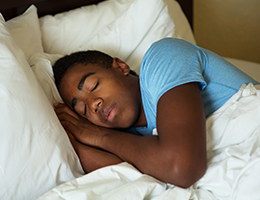
There's nothing like a good night's rest to help you get ready for a brand-new day. And that's just as true for your teen.
In fact, getting enough shut-eye plays a particularly vital role during the teen years. It's a time of big change—when a lot of physical, emotional, mental and social changes are occurring, according to the National Sleep Foundation (NSF).
Adequate sleep helps support teen development during this transitional period, the NSF notes. And yet too many teens don't get enough of the sleep they need.
Why is that? And how can parents help?
Missing sleep
To function well during the day, teens typically need 8 to 10 hours of sleep at night, the American Academy of Sleep Medicine (AASM) reports. Most make do with 7 1/2 or fewer hours on school nights.
A key reason for this behavior is teens' normal sleep cycle. Many adolescents are natural night owls; their inclination is to stay up late at night and then sleep in until 8 or 9 a.m.
But teens' inner clocks conflict with most high school schedules. Because of early start times, kids all too often stagger out of bed and then go about their days in a fog.
The toll on teens
Chronic sleep deprivation has consequences for teens. Among them:
- A lack of sleep can sabotage learning, making it difficult to concentrate or remember information. Grades may slip.
- Sleep deficits slow reaction times, which can hurt athletic performance.
- Tired teens are often irritable and moody. Teens robbed of sleep also appear to feel more anxious and sad than well-rested ones.
- Adolescents who continually skimp on sleep may be prone to obesity, possibly because sleep-deprived kids (and adults) tend to snack indiscriminately.
- Drowsy teen drivers may endanger themselves and others.
- Sleep-deprived teens may be prone to getting sick more often.
A better way
All of this is why parents need to watch out for signs that their teens may not be getting enough shut-eye. Red flags include oversleeping in the morning, falling asleep in class or having problems concentrating.
To help a sleep-deprived teen get adequate rest, try these tips from the AASM and other experts:
Work together. Talk with your teen about the negative effects of sleep deprivation and how great it feels to get a good night's rest. Then, together with your teen, try to establish a reasonable bedtime routine.
Encourage consistency. Caution your teen against staying up too late on Friday or Saturday and then compensating by sleeping very late the following morning. Doing so makes it hard to return to a school-friendly schedule on Monday. As a general rule, teens should be discouraged from sleeping more than two hours past their normal wake-up time.
Let bright light in. Opening curtains in the morning will expose your teen to sunlight, which is a natural wake-up cue.
Decrease nighttime distractions. Keep the smartphone, TV and computer out of your teen's bedroom. And, though this won't earn you any popularity points, set a communications curfew—a time after which your teen can't use the phone or text messages. For example, you might choose to restrict these activities 30 minutes before bedtime.
Scrutinize your child's schedule. Too many after-school activities can crowd out sleep.
Encourage activity. Exercise improves sleep, as long as it's not done too close to bedtime.
Go easy on weeknight chores. Let your teen focus on homework on school nights and help out at home on weekends. Like after-school activities, too many at-home obligations also can leave too little time for sleep.
Say no to caffeine. Help your teen avoid caffeine, found in colas, coffees and teas—especially late in the day.
Remember, a well-rested teen is generally an easier teen to live with—and that alone is reason enough to help your teen get the sleep they need.
Reviewed 6/9/2025